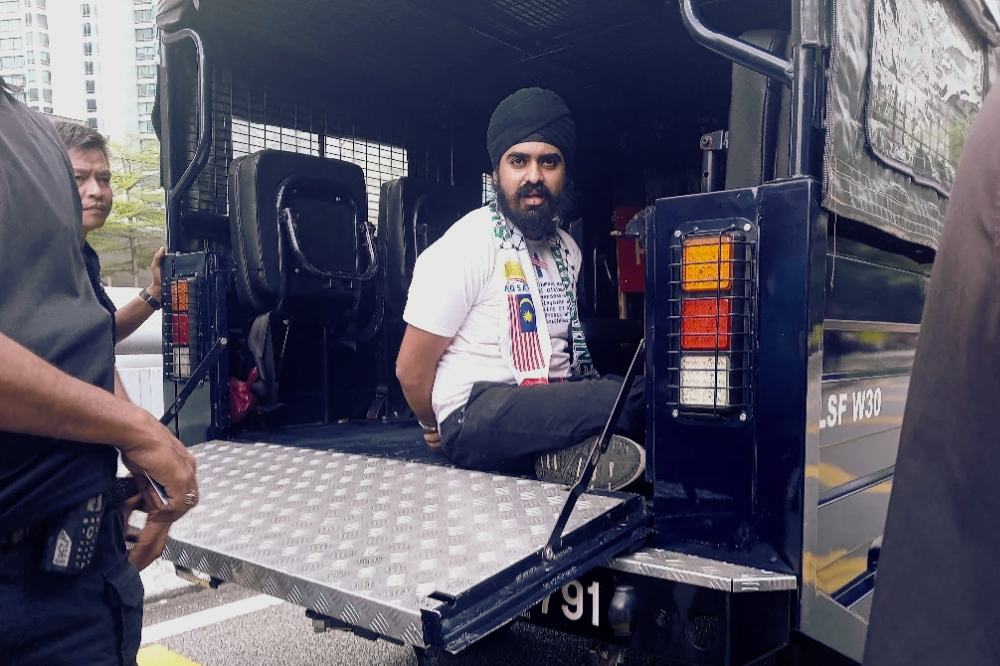Arrest of pro-Palestine protestor at US Embassy raises diplomatic impunity in Malaysia
Harmit Singh, 28, was reportedly stopped and held for about an hour by the police, citing his proximity to the embassy's entrance as grounds for his detainment according to news reports.

SHAH ALAM - In a dramatic turn of events near the United State (US) of America’s embassy in Jalan Tun Razak on Saturday, a young man found himself temporarily detained by local authorities during a pro-Palestine protest.
Harmit Singh, 28, was reportedly stopped and held for about an hour by the police, citing his proximity to the embassy's entrance as grounds for his detainment according to news reports.
Eyewitnesses recounted the scene, highlighting Harmit's intention was merely to convey the group's plan to deliver a memorandum to the embassy, stating that despite prior notification to both the police and the embassy regarding the protest, Harmit's approach was met with resistance from law enforcement, who asserted that protests would typically take place at a distance from the embassy grounds.
This incident has sparked discussions surrounding the perceived immunity enjoyed by diplomatic missions, particularly that of the US, on Malaysian soil. While diplomatic immunity is a well-established principle in international law, ensuring the smooth functioning of diplomatic relations, questions arise when such privileges seem to overshadow local law enforcement and public expression.
Critics argue that the temporary detention of Harmit raises concerns about the extent of diplomatic immunity and its implications for civil liberties within Malaysia. The perceived untouchability of foreign embassies, particularly that of the US, raises questions about the balance of power and accountability in such situations.
Human rights watch group Suara Rakyat Malaysia (Suaram) has called for the government to review police procedures for facilitating public assemblies, following Harmit's temporary detention during an assembly.
“Prohibition of intimidation tactics should be prioritised, and the grounds for restrictions (must be) based on principles of necessity, proportionality and legitimacy,” said Suaram’s executive director Sevan Doraisamy in a statement on Sunday.
Sevan added that police officers should go through “sensitisation training” to ensure that public assemblies are regulated according to human rights.
The police later released Harmit after the organisers submitted a memorandum to the embassy’s representative calling for the US to push for an immediate and permanent ceasefire in Palestine, stop selling weapons to Israel, and “end Israeli impunity”.
Sevan said the detention was uncalled for as GegarAmerika had informed the police and the embassy of the assembly and the plan to submit a memorandum.
“There was no basis to presume that the rally would become violent, given the organiser’s full compliance with peaceful assembly procedures and traffic regulations. This arrest tramples on laws that safeguard the right to protest peacefully, and freedom of expression,” he added.
Parti Sosialis Malaysia, who was also present, along with other civil society groups, has called for a reevaluation of the protocols governing diplomatic missions' activities within Malaysian territory, emphasising the need for clearer guidelines to prevent instances where diplomatic immunity may infringe upon the rights of Malaysian citizens to peacefully assemble and express their grievances.
The memorandum was endorsed by PSM, Muda, Pemuda Sosialis, Bersih, Suaram and several youth and university groups.
In response to this, the US Embassy as quoted by FMT, has since reaffirmed its commitment to respecting local laws and regulations while upholding diplomatic protocols.
On Jan 13 last month, Boycott Disinvest and Sanction Movement (BDS) organised the "Global Day of Action: Ceasefire Now" protest at the same location - opposite of the US Embassy. Many of its participants wanted to march forward to the embassy but was asked to maintain at the same location to avoid issues.
Such events also sparked questions as to why protestors, who were "practicing their freedom of expression", were not allowed to do so with some labelling the Americans as "hypocrites".
Meanwhile, from Dec 26 to 31 last year, the US embassy experienced a six-day "blockade" orchestrated by the Sekretariat Solidariti Palestin aimed to exert pressure on the US government regarding the Middle East conflict, garnering participation from local politicians including former Batu MP Tian Chua and non-governmental organisations.















